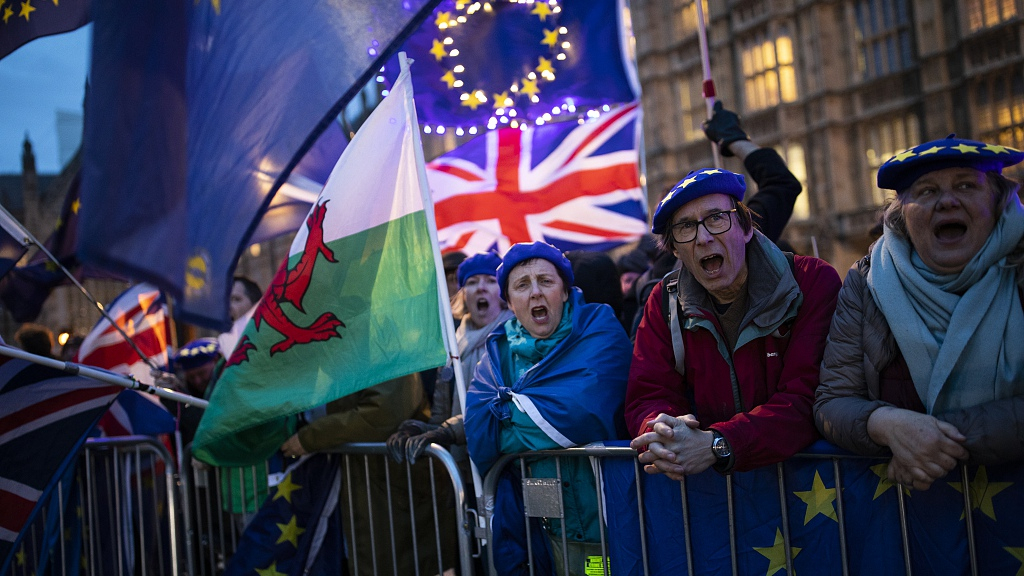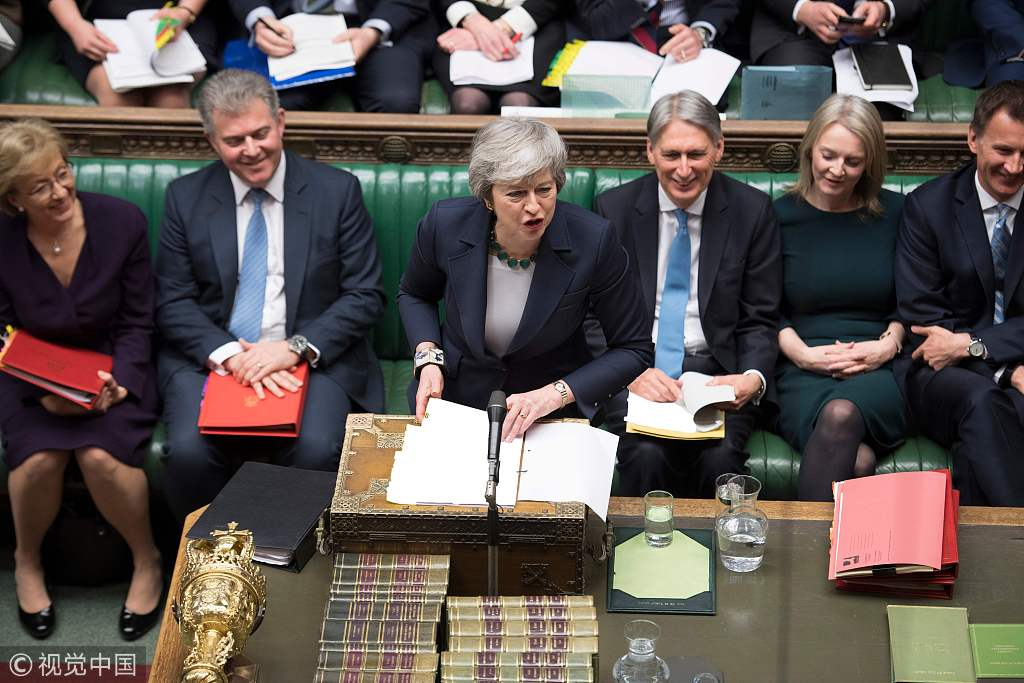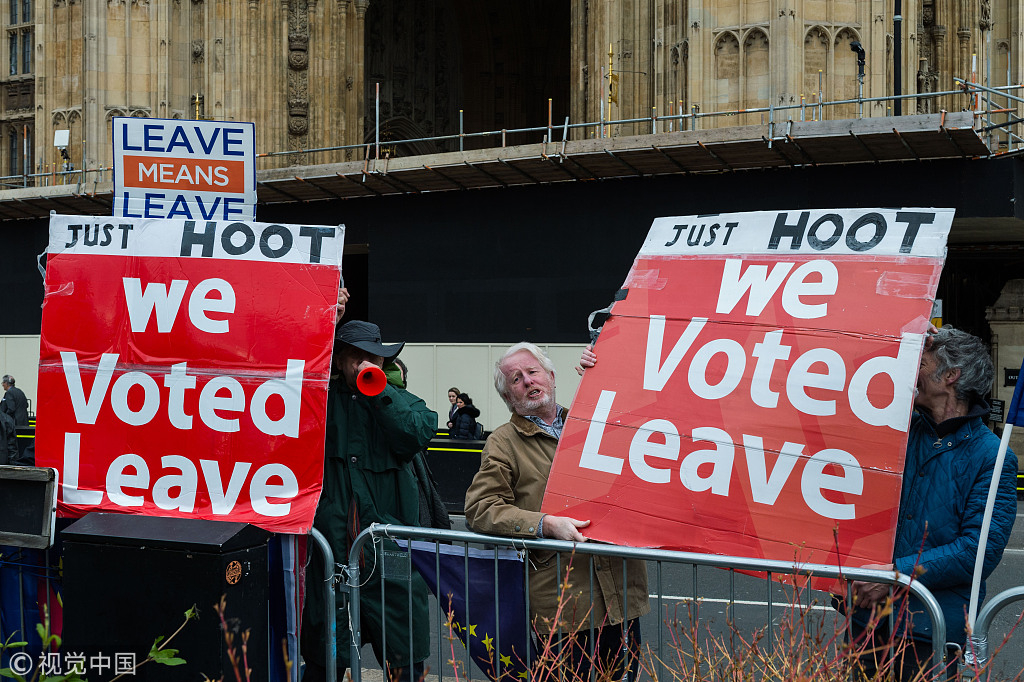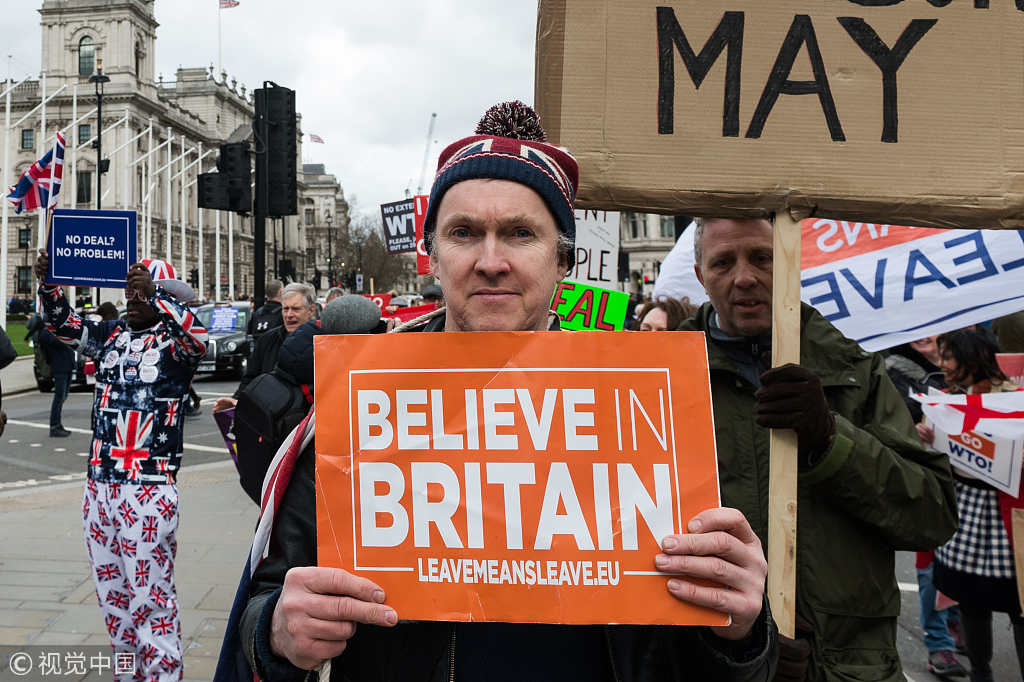
Opinion
19:45, 14-Mar-2019
Is Theresa May's no-deal exit still possible?
Paula Yu

Editor's note: Paula Yu is a partner at the Grandall Law Firm in Shanghai. The article reflects the author's views, and not necessarily those of CGTN.
This month has witnessed a series of dramatic events in association with the UK's exit from the EU. On March 12, 2019, UK Prime Minister Theresa May was defeated for a second time on her proposed Brexit deal despite her repeated plea to “get the deal done.” In comparison with the last record margin of 230 votes approximately two months ago, Theresa, this time, lost by a less crushing majority of 149 votes.
Before the hard Brexiteers had time to cheer for the imminent possibility of a no-deal Brexit, on March 13, 2019, MPs turned down such possibility by a narrow margin of four votes. This recent decision by MPs has not completely eliminated the possibility of a no-deal exit but pushed the matter into a stalemate in which MPs expect to lead the future negotiation with the EU. MPs are scheduled to vote on the possibility of delaying the UK's exit from the EU this Thursday.

A handout photograph released by the UK Parliament on March 13, 2019, shows Britain's Prime Minister Theresa May speaking during the weekly Prime Minister's Questions session in the House of Commons in London on March 13, 2019. /VCG Photo.
A handout photograph released by the UK Parliament on March 13, 2019, shows Britain's Prime Minister Theresa May speaking during the weekly Prime Minister's Questions session in the House of Commons in London on March 13, 2019. /VCG Photo.
Of course, the possible extension is also subject to further negotiation with the EU, and unfortunately, with the second defeat in Westminster, Theresa has lost much of her credibility to negotiate with EU leaders on a possible extension and/or the length of such an extension.
The MPs' decision to turn down the no-deal Brexit brought a sigh of relief to many in the UK and even in the EU. After all, no European countries would benefit from a no-deal Brexit with the UK and Ireland being hurt the most. Many hard Brexiteers would insist that no deal is better than a bad deal.
What is the point of negotiating with the EU, an organization the UK dislikes and is going to walk out? Why should the UK pay a substantial exit bill to erode any gains from leaving the EU? Why cannot the UK simply walk out? These are overwhelming moods behind the two defeats of Theresa May by MPs with little support of rational analysis and better alternatives.
Hard Brexiteers has offered little help on the most pressing and controversial issue in Theresa May's two proposals: the hard border in Ireland. For the time being, there are approximately 500km open border between Ireland and the UK and goods and people are allowed to move freely across the border without any oversight from either the UK or the Irish government.
With a no-deal exit, customs and security checks may be required to cover the current 500km open border, substantially damaging the trading relationship between the UK and Ireland. Hard Brexiteers are optimistic that the UK would be able to reach a soft border compromise with Ireland to maintain the trade flow, which is consistent with a statement of the UK government as of March 13, 2019.

Pro-Brexit supporters protest outside the Houses of Parliament in London as they campaign for a no deal Brexit. /VCG Photo.
Pro-Brexit supporters protest outside the Houses of Parliament in London as they campaign for a no deal Brexit. /VCG Photo.
For the time being, no detailed soft-border alternatives have been developed to sufficiently address the concerns of all parties involved, including Ireland, the UK and the EU.
Hard Brexiteers believe that the UK can survive and subsequently prosper from a no-deal exit without much trade disruptions. A no-deal Brexit means that the UK will trade under the World Trade Organization (WTO) rules, as many non-EU countries are currently doing. It remains questionable whether the UK can roll over the EU's trade deals with more than 50 countries and it would take time and efforts for the UK to negotiate and reach trade deals with individual countries after its exit.
Hard Brexiteers, however, are more focused on opportunities offered by a no-deal exit for the UK to independently negotiate more beneficial bilateral trading agreements with countries like China to strengthen their existing business relationship further.
Customs and regulatory compliance pose substantial difficulties to a no-deal exit. It remains highly unlikely that the UK can keep its borders open without controls and tariffs as currently proposed by hard Brexiteers without cooperation from the EU and some adjustment to WTO rules.
Similarly, a no-deal Brexit would take the UK out of all of EU's agencies and courts while alternatives may take years to establish. Whether and how the UK can manage to maneuver through such a transitional period remains a daunting challenge.
It is clear that the UK needs a deal with the EU for a smooth and mutually beneficial exit from the EU.

Pro-Brexit supporters protest outside the Houses of Parliament in London as they campaign for a no deal Brexit. /VCG Photo.
Pro-Brexit supporters protest outside the Houses of Parliament in London as they campaign for a no deal Brexit. /VCG Photo.
Fortunately, the UK has spoken on March 13 and MPs have voted in the right direction. Unfortunately, the EU is running out of patience, and both Theresa May and the UK are running out of time.
Theresa did not have much leverage to start within her exit negotiation with the EU leaders and her credibility has been seriously damaged after two rejections by MPs. An extension would require the universal approval of 27 EU leaders, who are unwilling to grant such extension absent a credible justification and a definitive extension deadline.
The recent MPs' decisions have demonstrated a strong willingness by MPs to play a more significant role in the exit negotiation with the EU. It is in the interest of all European countries for the EU and the UK to return to the negotiation table in search for a less evil than a no-deal Brexit.
(If you want to contribute and have specific expertise, please contact us at opinions@cgtn.com.)

SITEMAP
Copyright © 2018 CGTN. Beijing ICP prepared NO.16065310-3
Copyright © 2018 CGTN. Beijing ICP prepared NO.16065310-3